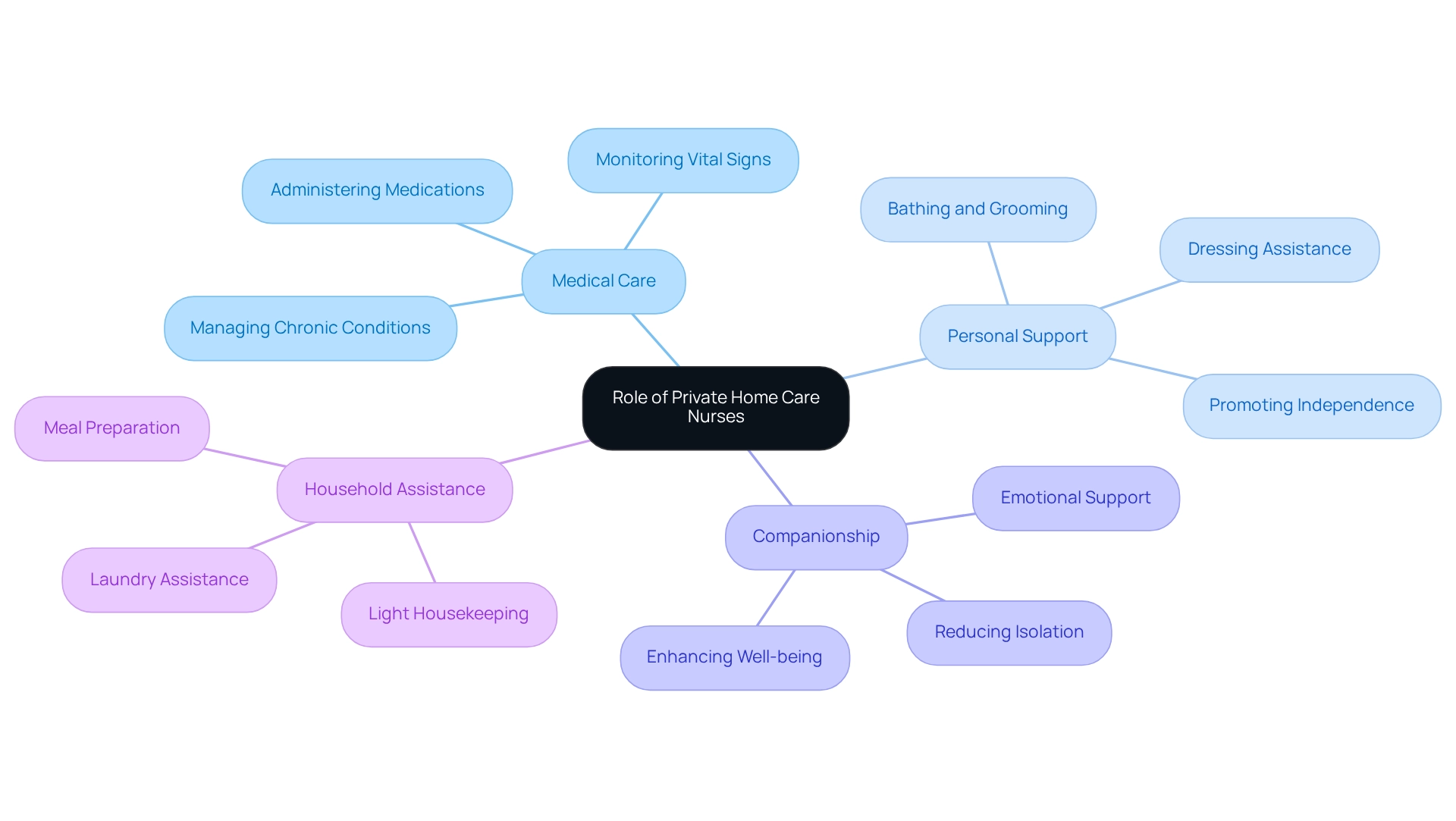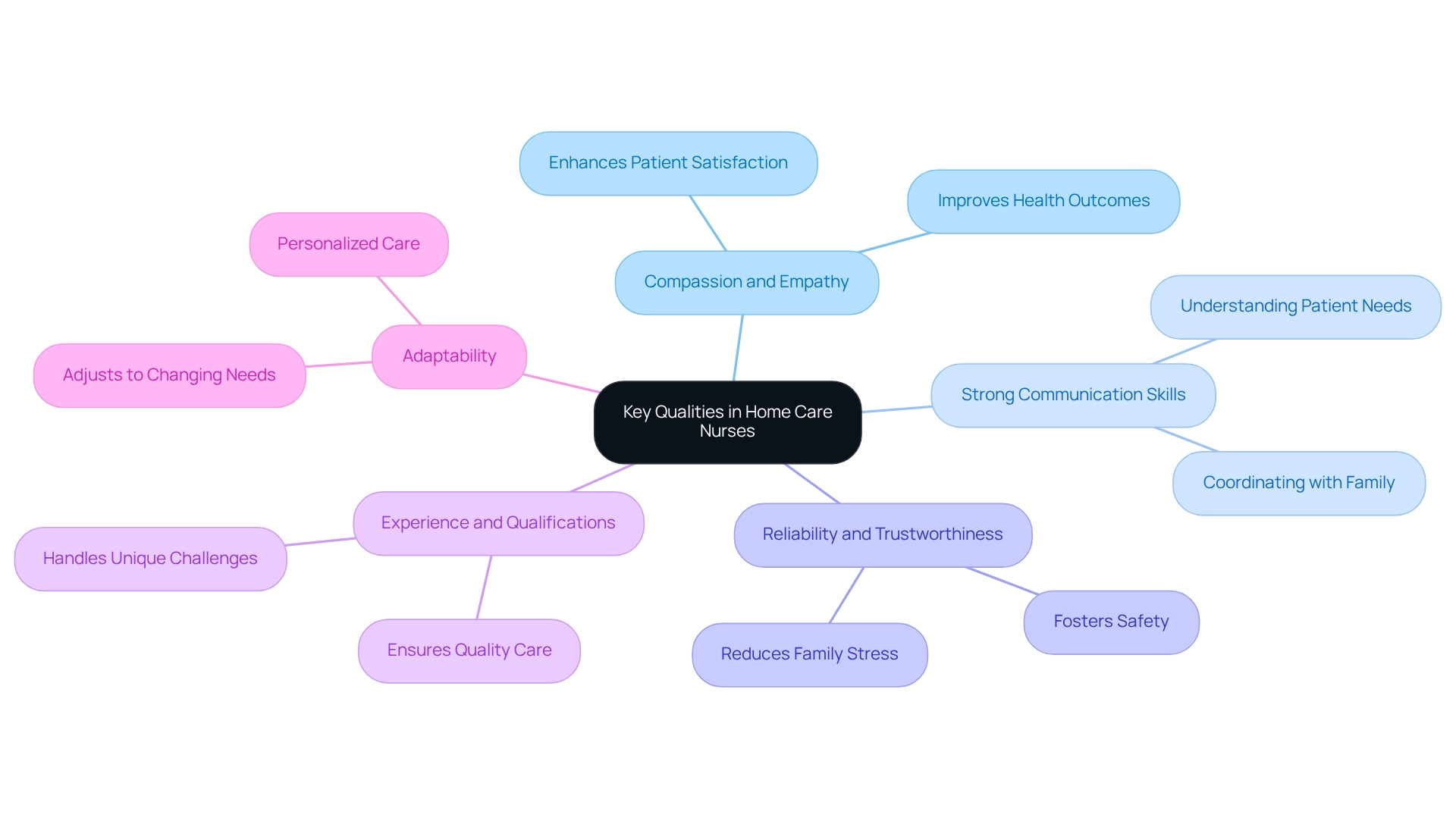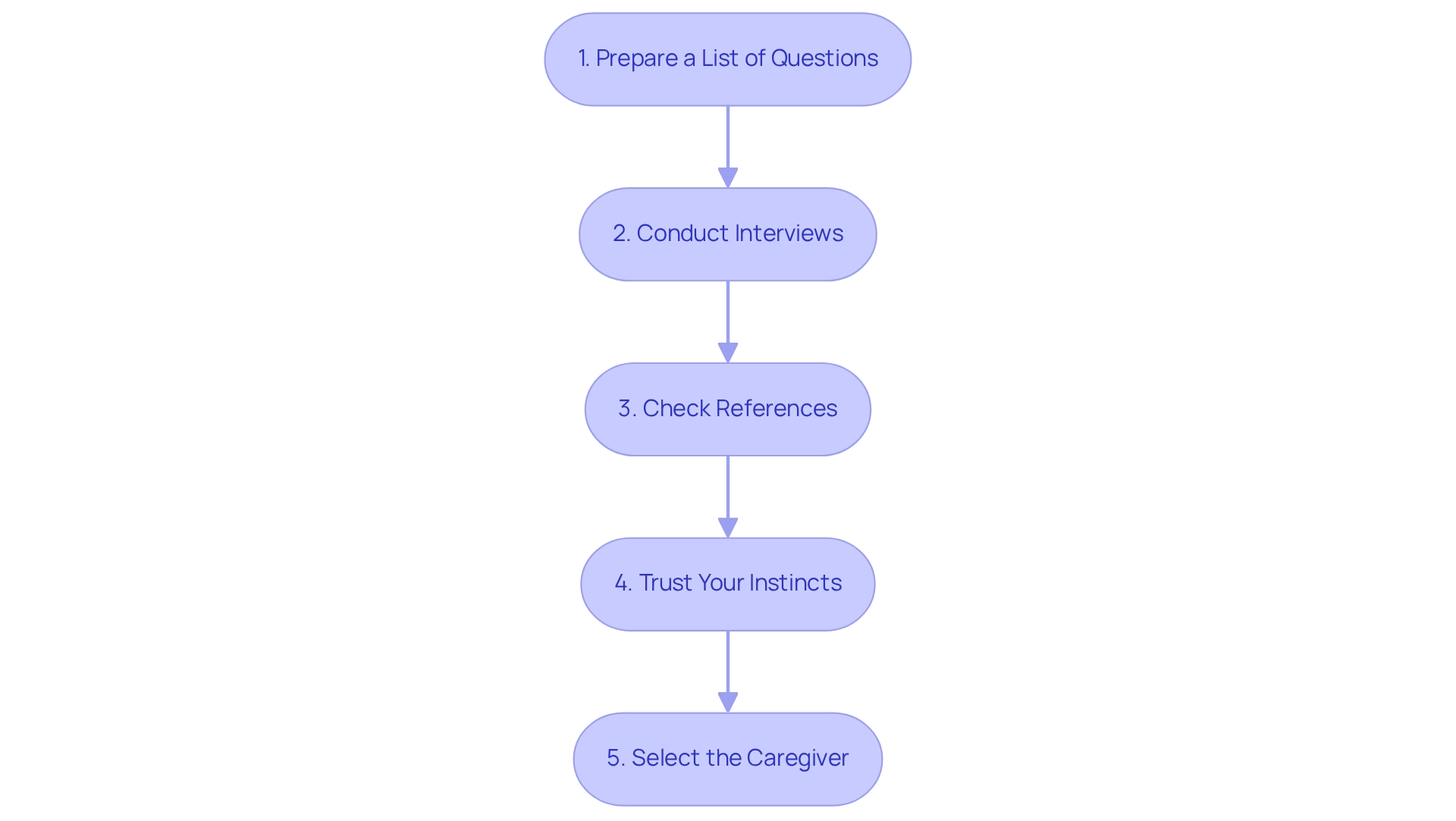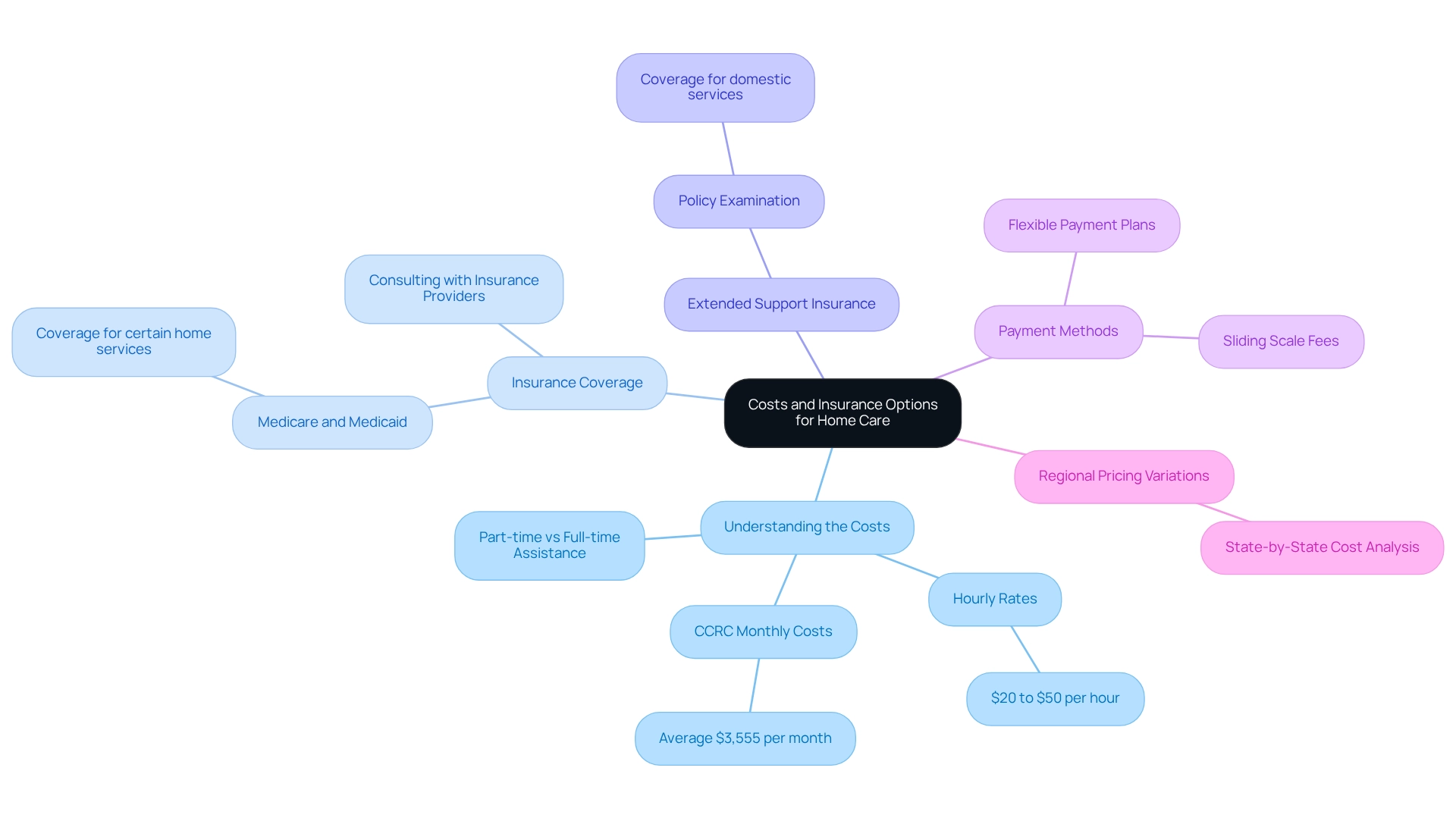Overview
The primary focus of this article is to offer families a compassionate and structured approach for selecting private home care nurses. We understand that this decision can be overwhelming, which is why it’s crucial to grasp the roles, qualities, evaluation methods, and financial aspects involved. By outlining essential steps—such as assessing necessary care services, identifying desirable qualities in a nurse, conducting thorough interviews, and evaluating costs and insurance options—we aim to empower families to make informed choices that truly meet their loved ones’ specific needs.
In addition, we recognize the emotional weight of this journey. It’s not just about care; it’s about finding the right support for your family. As you navigate this process, remember that you are not alone. We’re here for you, guiding you through every step with understanding and care. By focusing on what matters most—your loved one’s comfort and well-being—you can feel confident in your decisions.
Furthermore, we encourage you to reflect on your unique circumstances and needs. What qualities are most important to you in a caregiver? How can you ensure that the chosen nurse aligns with your family’s values? These questions are vital in creating a nurturing environment for your loved one.
As a result, we hope this article serves as a reassuring resource, equipping you with the knowledge and confidence to make the best choice for your family. Your comfort is our priority, and we are dedicated to supporting you through this important decision.
Introduction
In the evolving landscape of healthcare, private home care nurses play an indispensable role in delivering personalized medical and emotional support to patients in the comfort of their homes. These dedicated professionals not only provide essential medical care and personal assistance but also foster companionship that combats feelings of isolation, particularly among the elderly. As families increasingly seek alternatives to traditional nursing facilities, understanding the multifaceted services offered by home care nurses becomes crucial.
This article delves into the vital functions of private home care nurses, the key qualities to look for when selecting a caregiver, and the steps to evaluate potential candidates. We’re here to ensure that your loved ones receive the best care tailored to their unique needs. Together, we can navigate this journey with compassion and understanding.
Understand the Role of Private Home Care Nurses
Private home care nurses provide a diverse array of services tailored to meet the unique needs of each patient. Their primary roles include:
- Medical Care: This service involves administering medications, monitoring vital signs, and managing chronic conditions, ensuring patients receive essential medical attention in the comfort of their homes. Without proper medical oversight, chronic conditions can worsen, and new health issues may go unnoticed, highlighting the critical need for professional support.
- Personal Support: Nurses assist with vital daily activities such as bathing, dressing, and grooming, promoting dignity and independence for those they care for. This support is crucial in preventing hygiene-related issues that could lead to infections and other health complications.
- Companionship: Providing emotional support and companionship is essential, as it helps reduce feelings of isolation and enhances the overall well-being of patients. Seniors who lack companionship may face depression and anxiety, making the role of caregivers even more significant. As Dr. Stephen Hoag emphasizes, caregiving can be incredibly challenging, and leading with love is vital in these relationships.
- Household Assistance: Many nurses also help with light housekeeping, meal preparation, and laundry, contributing to a more comfortable living environment. This support not only creates a safe and structured space but also addresses the risk of inadequate nutrition that may arise from insufficient meal preparation.
Understanding these functions is crucial for families to accurately assess the specific support needs of their loved ones. Home health services are often more affordable and convenient than hospital or nursing facility care, making them an appealing choice for families. With the domestic support sector expected to grow significantly, the demand for skilled private home care nurses is rising, highlighting their essential role in enhancing patient care and quality of life. Indeed, the overall employment for health and personal support aides is projected to increase from approximately 3.96 million to 4.78 million by 2033, reflecting the growing reliance on these services. By recognizing the importance of personal support providers, families can ensure they select the right assistance to meet their loved ones’ needs effectively. If you’re considering domestic support services, we invite you to reach out to Best Care Nurses Registry today to discuss how we can assist you.

Identify Key Qualities in Home Care Nurses
When selecting private home care nurses, it’s essential to consider several important qualities that can significantly impact the care your loved one receives.
- Compassion and Empathy: A skilled nurse should genuinely prioritize their patients’ well-being and possess the ability to empathize with their situations. Research shows that empathetic support greatly enhances patient satisfaction and health outcomes, highlighting the importance of these qualities in nursing.
- Strong Communication Skills: Effective communication is crucial for understanding patient needs and coordinating with family members. Nurses who excel in communication can manage complex treatment situations more effectively, ensuring that everyone involved is informed and engaged in the process.
- Reliability and Trustworthiness: Families must trust that their caregiver will be punctual and dependable. A reliable caregiver fosters a sense of safety, allowing family members to focus on their loved ones’ needs without added stress.
- Experience and Qualifications: Seek caregivers with appropriate certifications and experience in home settings. Skilled medical professionals are often better equipped to handle the unique challenges that arise in domestic environments, ensuring quality care.
- Adaptability: The ability to adjust to changing needs and schedules is vital in home support settings. Private home care nurses who can adapt their approach based on the patient’s evolving condition or family dynamics provide a more personalized experience, ensuring that they offer not only medical assistance but also emotional support, significantly enhancing the patient’s overall quality of life. For instance, case studies have shown that organizations prioritizing compassionate support and effective communication see improved patient outcomes and satisfaction levels.
To secure personalized home health support services, follow these simple steps:
- Call (888) 203-2529 to speak with our friendly staff and discuss your needs.
- We’ll collaborate with you or your loved one to develop a customized health plan with your physician.
- We will refer compassionate caregivers for you to choose from, ensuring a perfect fit for your family, including those with pets.
A brighter future for your loved one is just a phone call away. Remember, we’re here for you, and your comfort is our priority.

Evaluate and Interview Potential Caregivers
To effectively evaluate and interview potential home care nurses, consider these thoughtful steps:
-
Prepare a List of Questions: Formulate questions that explore their experience, caregiving philosophy, and responses to specific scenarios. For instance:
- “Can you describe your experience with patients who have similar needs?”
- “How do you handle emergencies?”
-
Conduct Interviews: Schedule face-to-face or virtual interviews to assess their communication skills and personality. Observe their interactions with your cherished individual; this can reveal their ability to connect and provide compassionate support. This connection is essential, especially when determining if your elderly relative may benefit from CNA/HHA caregiver services. Such needs may arise from challenges in daily activities like personal hygiene, dressing, cooking, cleaning, or managing medications, as well as health concerns such as chronic conditions or recent surgeries.
-
Check References: Always request and follow up with references to confirm their past performance and reliability. Comprehensive background checks are crucial, ensuring that caregivers have been adequately screened, which upholds the trust that families place in home healthcare providers.
-
Trust Your Instincts: Reflect on how comfortable you and your loved one feel with the caregiver. A strong personal connection is vital for effective care, as emotional bonds can greatly enhance the caregiving experience.
By following these steps, families can select private home care nurses who not only meet their loved one’s medical needs but also align with their personality and lifestyle, thereby fostering a supportive and trusting environment. Furthermore, at Best Care Nurses Registry, we offer personalized caregiver matching services to ensure you find a compassionate caregiver who is the perfect fit for your household. Connecting with us for tailored caregiver matching can lead to a brighter future for your loved one—CALL (888) 203-2529 to schedule a consultation.

Consider Costs and Insurance Options
When considering private home care nurses, it’s essential to understand the associated costs and available insurance options, as these factors can greatly impact your peace of mind.
Understanding the Costs: The price of home care services can vary significantly, typically ranging from $20 to $50 per hour based on the level of care required. For families contemplating round-the-clock support, these costs can accumulate quickly. It’s vital to evaluate whether part-time or full-time assistance is necessary, as this decision will directly affect your overall expenses. Additionally, Continuing Care Retirement Communities (CCRCs) demand an average of $3,555 monthly, highlighting the importance of comprehending the broader financial landscape of support options.
Insurance Coverage: Have you consulted with your insurance provider to clarify which domestic support services are covered? Many plans, including Medicare and Medicaid, may cover certain types of health services provided at home, but the specifics can vary widely. Understanding these nuances can empower families to make informed choices.
Extended Support Insurance: If you have extended support insurance, examining your policy is crucial. Does it provide coverage for domestic services? This can significantly alleviate out-of-pocket costs, offering financial relief during what can be a challenging time.
Payment Methods: Engage in conversations with the agency about payment methods. Many agencies offer flexible payment plans or sliding scale fees based on income, making services more accessible for everyone.
By thoroughly evaluating these financial aspects, households can better prepare for the expenses related to private home care nurses. This ensures they choose a service that aligns with their budgetary requirements. Furthermore, understanding local pricing differences, as emphasized in recent studies, can help families make informed choices regarding in-home support. Remember, “These expenses can accumulate rapidly, making it crucial for households to plan thoroughly when evaluating 24/7 assistance options.” Incorporating insights from case studies on state-by-state cost variations in home care can further inform families about how geographic location impacts care costs. We’re here for you, and your comfort is our priority.

Conclusion
Private home care nurses are truly essential in providing holistic care that encompasses not only medical assistance but also personal support and emotional companionship. They play a pivotal role in enhancing the quality of life for patients, particularly the elderly, by ensuring their medical needs are met while also addressing the emotional and social aspects of care. The multifaceted nature of their services—from managing chronic conditions to offering companionship—underscores the growing importance of these professionals in the healthcare landscape.
When selecting a private home care nurse, families should prioritize key qualities such as:
- Compassion
- Strong communication skills
- Reliability
- Relevant experience
These attributes significantly enhance the caregiving experience, ensuring that patients receive the personalized support they truly deserve. By effectively evaluating potential caregivers through interviews and reference checks, families can find the right match that aligns with their loved ones’ needs and preferences.
Understanding the financial implications of home care is equally important. By exploring costs, insurance options, and payment plans, families can make informed decisions that fit their budgets while securing quality care. As the demand for home care services continues to rise, being well-informed about the roles, qualities, and costs associated with private home care nurses will empower families to navigate this journey with confidence and compassion. Ultimately, this knowledge ensures that their loved ones receive the best possible care tailored to their unique situations.
Frequently Asked Questions
What services do private home care nurses provide?
Private home care nurses offer a diverse array of services including medical care, personal support, companionship, and household assistance tailored to meet the unique needs of each patient.
What does the medical care service involve?
Medical care involves administering medications, monitoring vital signs, and managing chronic conditions to ensure patients receive essential medical attention in the comfort of their homes.
How do private home care nurses assist with personal support?
Nurses assist with daily activities such as bathing, dressing, and grooming, promoting dignity and independence while preventing hygiene-related issues that could lead to infections.
Why is companionship an important service provided by home care nurses?
Companionship provides emotional support, reduces feelings of isolation, and enhances overall well-being, which is particularly important for seniors who may face depression and anxiety.
What types of household assistance do private home care nurses offer?
Nurses help with light housekeeping, meal preparation, and laundry, contributing to a comfortable living environment and addressing the risk of inadequate nutrition.
Why is understanding the roles of home care nurses important for families?
Understanding these roles helps families accurately assess the specific support needs of their loved ones and ensures they select the right assistance effectively.
How do home health services compare to hospital or nursing facility care?
Home health services are often more affordable and convenient than hospital or nursing facility care, making them an appealing choice for families.
What is the projected growth for health and personal support aides?
The overall employment for health and personal support aides is projected to increase from approximately 3.96 million to 4.78 million by 2033, reflecting the growing reliance on these services.
How can families find assistance from private home care nurses?
Families considering domestic support services can reach out to Best Care Nurses Registry to discuss how they can receive assistance tailored to their needs.











